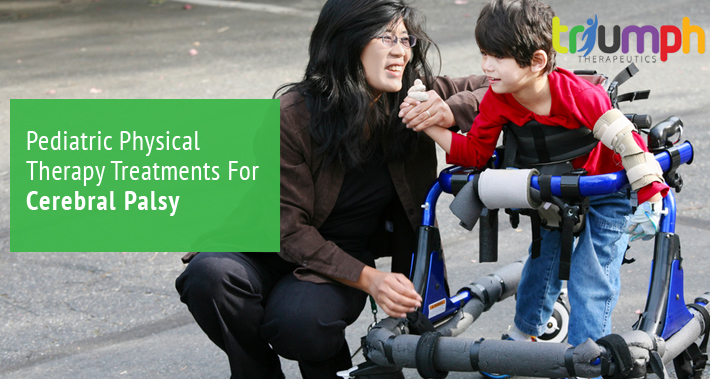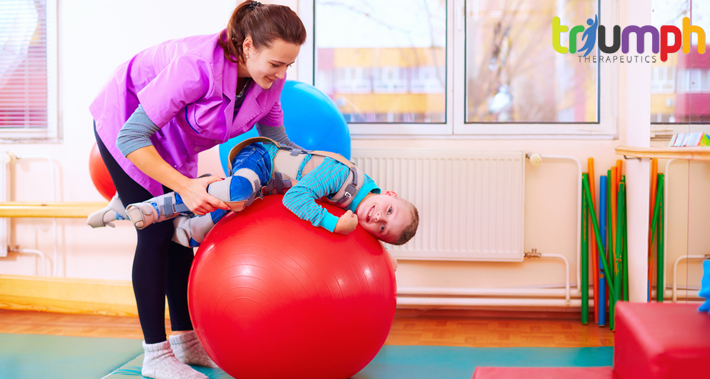Pediatric Physical Therapy Treatments For Cerebral Palsy
https://www.triumphtherapeutics.com/wp-content/uploads/2021/09/Triumph-Therapeutics-Speech-Therapy-OT-Physcial-Therapist-Washington-DC-Sep01-01-2021.jpg 710 379 Triumph Therapeutics Triumph Therapeutics https://www.triumphtherapeutics.com/wp-content/uploads/2021/09/Triumph-Therapeutics-Speech-Therapy-OT-Physcial-Therapist-Washington-DC-Sep01-01-2021.jpgDoes your child have cerebral palsy?
Are they having problems with their joints, muscles, and movement?
Your child might benefit from DC pediatric physical therapy.
Whether you’ve been looking for help for some time or if you have a child with a new diagnosis, we can help.
Keep reading to find out how.
What Is Cerebral Palsy?
Cerebral palsy is an umbrella term for a group of disorders that can affect the development of movement and posture.
Cerebral palsy is caused by an injury to the brain that occurs before, during, or up to two years after birth.
Infections, strokes, head trauma, or loss of oxygen are examples of injuries that can lead to cerebral palsy.
Brain damage doesn’t worsen after the initial injury, but the ability to do day-to-day activities that are affected by the injury may become increasingly difficult as your child grows.
People with cerebral palsy may have trouble seeing, hearing, feeling touch, thinking, or communicating, and they might also have seizures.
Cerebral palsy affects approximately four infants in every 1,000 born in the US.
What Are The Different Types Of Cerebral Palsy?
There are several types of cerebral palsy and each is categorized according to the type of movement problem that the cerebral palsy causes and the areas of the body that are affected.
Spastic cerebral palsy describes muscle spasms that can occur with large or fast movements.
Ataxic cerebral palsy describes those with difficulty coordinating & learning new movements.
Dyskinetic cerebral palsy is a type of cerebral palsy that causes unpredictable changes in muscle tone and movement that creates an unstable posture.
Mixed cerebral palsy is a combination of the above movement concerns (spastic, dyskinetic, or ataxic).
Quadriplegia is a type of cerebral palsy which affects both arms and legs, the neck, and the trunk of the body.
Diplegia affects either both legs, which is the most common form, or both arms (a less common form).
Hemiplegia is a cerebral palsy subtype that only impacts one side of the body.
Monoplegia is a rare type of cerebral palsy that affects only one limb.
What Are The Signs Of Cerebral Palsy In Young Children?
Although signs and symptoms of cerebral palsy are different from person to person, there are commonalities between cases.
Signs of congenital cerebral palsy can appear as early as the first few months of a baby’s life.
As a parent, you might start to notice these symptoms before your baby is two.
Some early symptoms include an inability for your baby to hold their head up as well as other babies of the same age, difficulty reaching with the arms, and difficulty with rolling, sitting, crawling, or walking.
Muscle weaknesses, tight muscles, inflexible joints, slower movements, and muscle tremors are also symptoms of cerebral palsy related to movement.
Cerebral Palsy And Torticollis
The muscle tightness and inflexible joints of cerebral palsy are similar to another condition – congenital muscular torticollis.
As a result, you can be forgiven for seeking congenital muscular torticollis physical therapy treatments when your child has cerebral palsy.
But it’s important to understand the difference between the two.
With torticollis, symptoms are generally limited to just neck and head stiffness.
If left for too long, torticollis can lead to other complications, like plagiocephaly.
However, there are far more tell tale signs of cerebral palsy than just these.
If your child’s muscles feel stiff in the neck, but not as much in other areas, it’s more likely to be torticollis.
However, if they feel stiff all over their body, it’s more likely to be cerebral palsy.
This is because cerebral palsy is a neurological disorder – the issue originates in the brain.
Torticollis, meanwhile, is a muscular condition – the issue has to do with the muscles in your child’s neck.
It takes more than this to diagnose both disorders, however, and it’s important to visit a professional pediatric therapy clinic to be sure.
Pediatric Physical Therapy For Cerebral Palsy
A physical therapist can be a great help for anyone with cerebral palsy.
Physical therapists can create a personalized treatment plan to help adults, children, and babies gain strength and movement.
Age 0-4
Pediatric physical therapists can help parents and caregivers improve their child’s movement development.
They can teach you to support the positioning, movement, feeding, play, and self-calming of children with cerebral palsy.
Your physical therapist can suggest ways to adapt your child’s home environment to encourage them to continue achieving their gross motor milestones and introduce play routines to strengthen communication, hearing, and vision.
Physical therapists are crucial in devising play routines that are fun and don’t come with the invasiveness or discomfort that can sometimes be associated with other medical treatments.
Age 5-18
Physical therapists are also trained to continue to help care for your child as they grow.
Physical therapists with experience working with older children and teenagers can support the highest quality of life through all stages of your child’s development.
Qualified physical therapists understand that treatment plans for cerebral palsy and you child’s goals will change as your child ages, with growth spurts requiring adjustments to physical therapy.
Your child’s physical therapist will encourage mobility and fitness, which will help them better function and perform, both at home and at school.
Physical therapy for adolescents with cerebral palsy focuses on preventing abnormal posture, while improving joint mobility and muscle strength.
Adolescence is the age and stage of life where lifelong healthy habits are formed.
Developing a personal fitness program at a young age will improve the health and function of those with cerebral palsy for the rest of their lives.
Physical therapists can also incorporate sporting activities that your child might already enjoy as part of their treatment plan and routine, with bowling, swimming, cycling, volleyball, tennis, or basketball as some popular options.
What About Physical Therapy For Adults With Cerebral Palsy?
Physical therapists are able to help meet the needs of anyone at any age with cerebral palsy.
Physical therapy for adults with cerebral palsy focuses on building strength, mobility, pain management, energy conservation, and use of helpful adaptive equipment where necessary.
Your physical therapist may also recommend changes to your home and work environment to help you remain independent.
Physical therapists can prescribe exercise routines for adults with cerebral palsy that enable them to stay strong and maintain functional independence.
Early intervention is ideal, but it’s never too late to seek physical therapy treatments for your cerebral palsy.
Book Your Appointment With Triumph Therapeutics Today
If you have a baby or child with cerebral palsy, or are an adult and want to know more about your treatment options and how you can manage your health condition, we can help.
Our trained physical therapists can provide care at all stages in each person’s development, and we tailor our care and treatment care to the unique needs of each individual.
contact us and book an appointment today.


